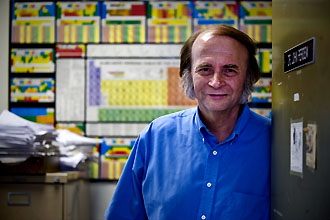Physics Professor Is One of World's Most Cited
With nearly 70,000 citations referring to his work on density functional theory, Tulane physics professor John Perdew is among the world's most-cited physicists if not the most cited in the last 30 years.

John Perdew, professor of physics at Tulane since 1977, may be the world's most-cited physicist. (Photo by Paula Burch-Celentano)
The accomplishment was uncovered by physics and math student Alan Liu, who ran reports on the 327 most-cited researchers listed by information company Thomson Reuters. Liu suggests that Perdew is the world's most cited physicist from 1981-2010.
“In the realm of science, journal articles typically reference other articles on which they are partly based. These citations are the authors' acknowledgments of their debt to the research findings of others,” says Jim McGuire, chair of the Tulane Department of Physics and Engineering Physics.
“John's citations show a clear path from the genesis of his ideas to the work of others and the improvement of science,” he says. “Citations are a widely used method to measure the impact of a scientist's work. By this standard John ranks as one of the world's top physicists.”
Five of Perdew's papers are among the 10 most-cited physics papers of the past 30 years. “Generalized Gradient Approximation Made Simple” from Physical Review Letters was the most-cited physics paper of the last 14 years.
In response, Perdew points to the researchers who came before him, including Tulane chemistry professor Mel Levy, who paved the way for the field of density functional theory. Perdew is careful not to over-interpret the results.
“My co-authored papers that appear on this list do so because they provide widely used approximate functionals for electronic structure calculations,” says Perdew. “An article's potential for citedness depends strongly on the population of researchers in its field and sub-field. Even within a sub-field, the most cited papers are not always the best ones.”
Perdew has won many accolades since joining Tulane in 1977, including a 2009 President's Award for Excellence in Professional and Graduate Teaching. Recently, he was celebrated for his life's work with a special magazine issue by the American Chemical Society.
